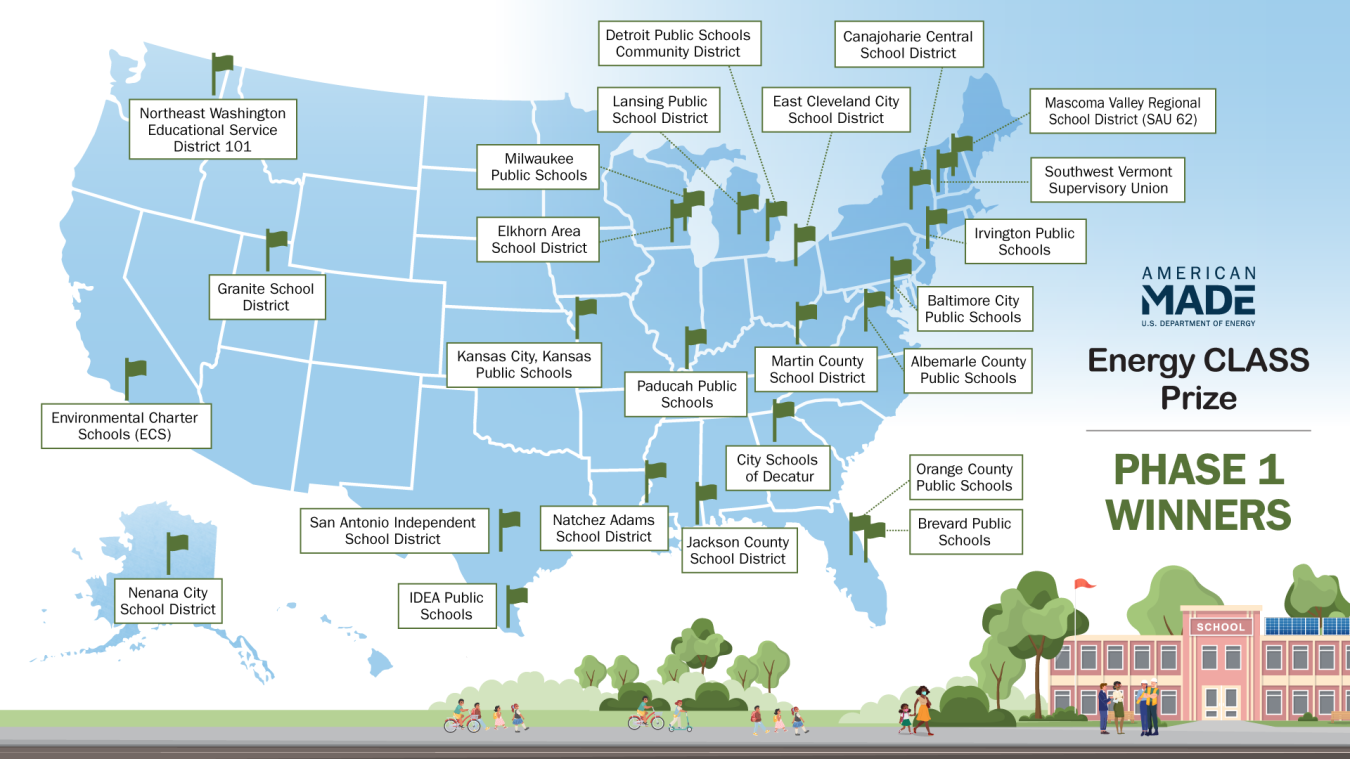As Part of President Biden’s Investing in America, Funding to Provide Winners Cash Awards and Trainings to Build Capacity for Energy Management in Local Education Agencies
WASHINGTON, D.C.—The Biden-Harris Administration, through the U.S. Department of Energy (DOE) today announces the Phase 1 Winners to share in the $4.5 million Energy Champions Leading the Advancement of Sustainable Schools Prize (Energy CLASS Prize), a competitive award promoting energy management in school districts across America. Twenty-five Local Education Agencies (LEAs) will each receive a $100,000 cash prize to establish, train, and support energy managers in their schools. These Energy Champions will develop projects and skills to lower energy costs, improve indoor air quality, and enhance learning environments in their communities. At the end of Phase 2, based on their performance, Phase 1 winners will be eligible for an extra $50,000 in funding. Energy CLASS Prize funds have the potential to impact over 700,000 students, in 1,300 schools, across 19 states. As part of President Biden’s Investing in America agenda, this funding from the Bipartisan Infrastructure Law advances the Department’s mission to streamline investments in clean energy workforce development, which is critical to the Biden-Harris Administration’s efforts to achieve net-zero emissions no later than 2050 while creating jobs, building a pipeline for young people, and supporting workers and communities across this nation.
“Energy improvements for schools create healthier learning environments for our children and can help them reach their full potential in the classroom,” said U.S. Secretary of Energy Jennifer M. Granholm. “This Training Network is a terrific example how President Biden’s Investing in America is working to support communities around the country by providing training to our nation’s schools that will allow them to cut costs and carbon pollution.”
In tandem with these awards, DOE is facilitating the creation of a Training Network to provide skills development and coaching for Energy Champions. By participating in this Training Network, Energy Champions will build proficiencies to identify, plan, and implement infrastructure upgrades, developing institutional capacity to make long-term energy management — and therefore long-term savings, carbon reductions, and health gains — a lasting feature of their communities.
The Energy CLASS Prize is administered by DOE’s Office of State and Community Energy Programs (SCEP). Interest in the Energy CLASS Prize was broad, diverse, and indicative of widespread need in school communities. LEAs from 30 states submitted applications, 33% of which included rural schools, and 60% of which included DOE-identified Disadvantaged Communities. All applications included schools that are eligible for Title 1 Schoolwide Programming, and 77% identified as serving populations in which 50% or more students qualified for Free and Reduced-Price Lunch. Submissions represented approximately 1.5 million students and teachers from schools across America.

Phase 1 Award Winners
- Albemarle County Public Schools, VA
- Baltimore City Public Schools, MD
- Brevard Public Schools, FL
- Canajoharie Central School District, NY
- City Schools of Decatur, GA
- Detroit Public Schools Community District, MI
- East Cleveland City School District, OH
- Elkhorn Area School District, WI
- Environmental Charter Schools, CA
- Granite School District, UT
- IDEA Public Schools, TX
- Irvington Public Schools, NJ
- Jackson County School District, MS
- Lansing Public School District, MI
- Martin County School District, KY
- Mascoma Valley Regional School District – SAU 62, NH
- Milwaukee Public Schools, WI
- Natchez Adams School District, MS
- Nenana City School District, AK
- Northeast Washington Educational Service District 101, WA
- Orange County Public Schools, FL
- Paducah Public Schools, KY
- San Antonio Independent School District, TX
- Southwest Vermont Supervisory Union, VT
- Unified School District No. 500, Kansas City, Kansas Public Schools, KS
Looking Forward
Phase 1 winners will move on to Phase 2 of the Prize, taking part in up to 160 hours of coaching, coursework, and skills development through the Energy CLASS Prize Training Network. Teams of Energy Champions will receive one-on-one support from professionals and experts in the field to pursue energy upgrade projects prioritized by their LEAs.
At the end of Phase 2, participants will submit a progress report on actions identified or taken, along with a plan for future building upgrades. Teams that demonstrate their dedication to financing and managing projects, establishing effective plans for long-term operations and maintenance, measuring and verifying impact, and championing their work publicly, will be eligible to receive an additional $50,000 cash prize. Phase 2 is expected to open in May of 2023 and conclude in May of 2024.
The Energy CLASS Prize supports the Biden-Harris Administration’s Justice40 Initiative to put environmental and economic justice at the center of America’s transition to a net-zero economy. The Energy CLASS Prize is part of SCEP’s broader Renew America’s Schools program, a $500 million program to help schools across the country implement infrastructure upgrades that will lower utility costs, improve indoor environmental quality, and reduce carbon emissions. The Energy CLASS Prize is administered by the National Renewable Energy Laboratory (NREL). In this role, NREL will disburse prize funds upon receipt from DOE. Email energyclassprize@nrel.gov with any questions. Visit American-Made Challenges to follow and learn more about the Energy CLASS Prize.
This announcement is part of President Biden’s Investing in America agenda, which is growing the American economy from the bottom up and middle-out – from rebuilding our nation’s infrastructure, to driving over $435 billion in private sector manufacturing and clean energy investments in the United States, to creating good paying jobs, developing a pipeline for the next generation of the clean energy workforce, and tapping into a clean-energy economy that will combat climate change and make our communities more resilient.
###